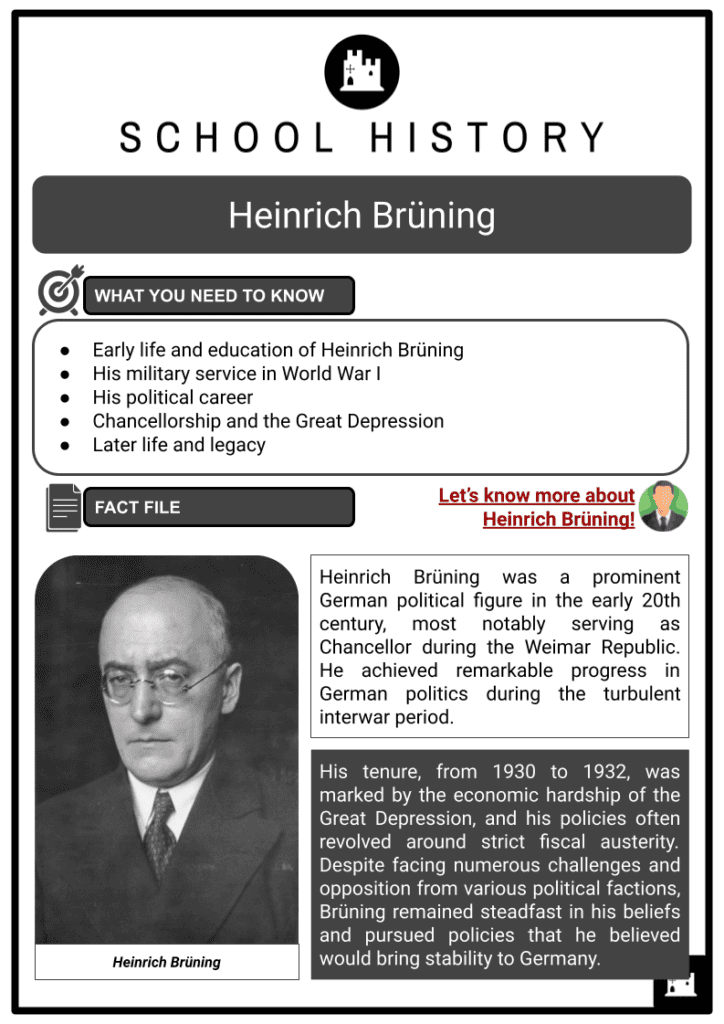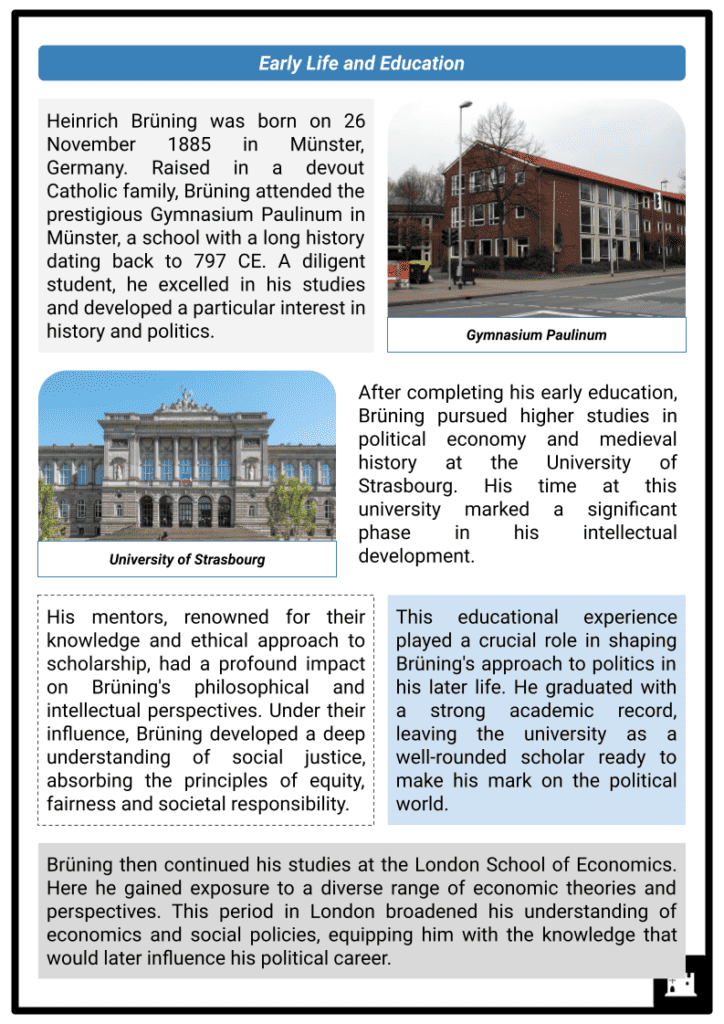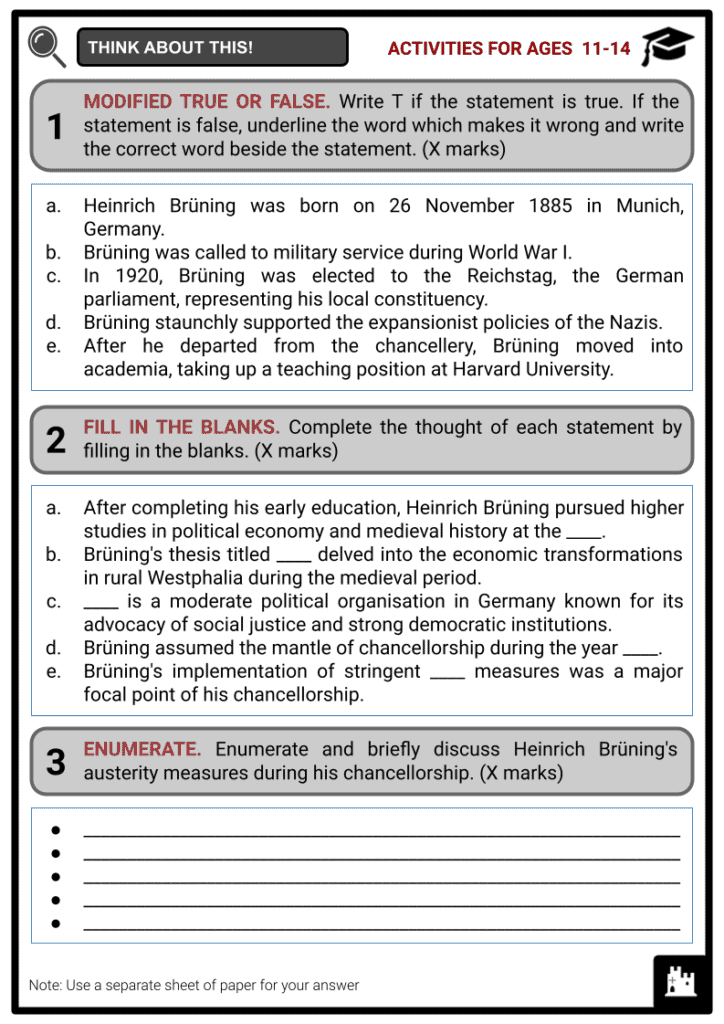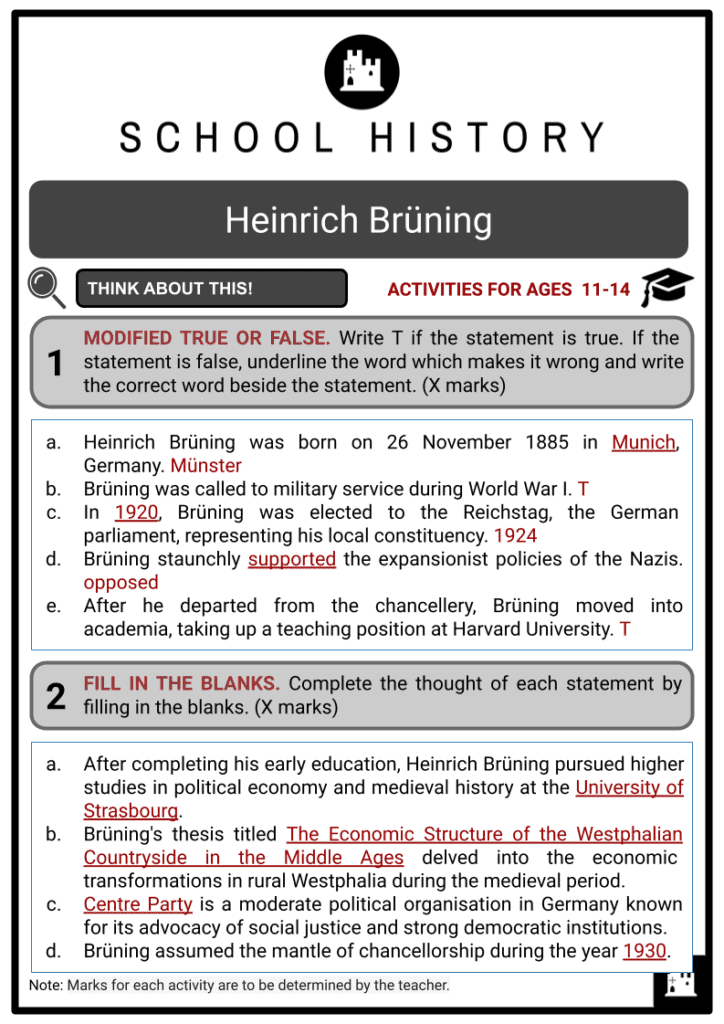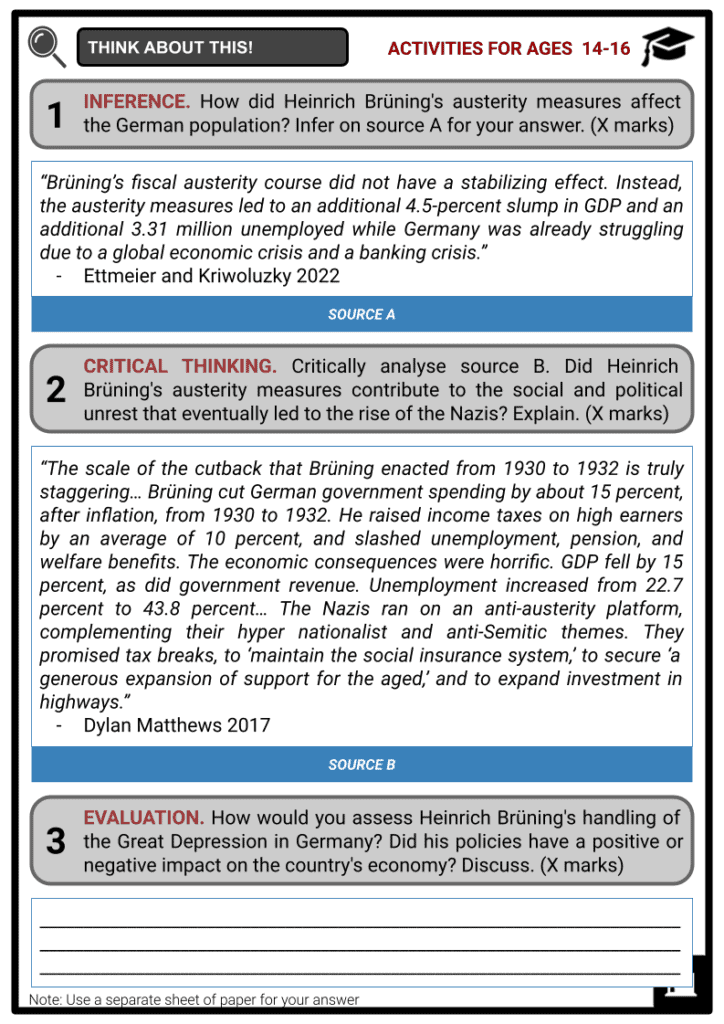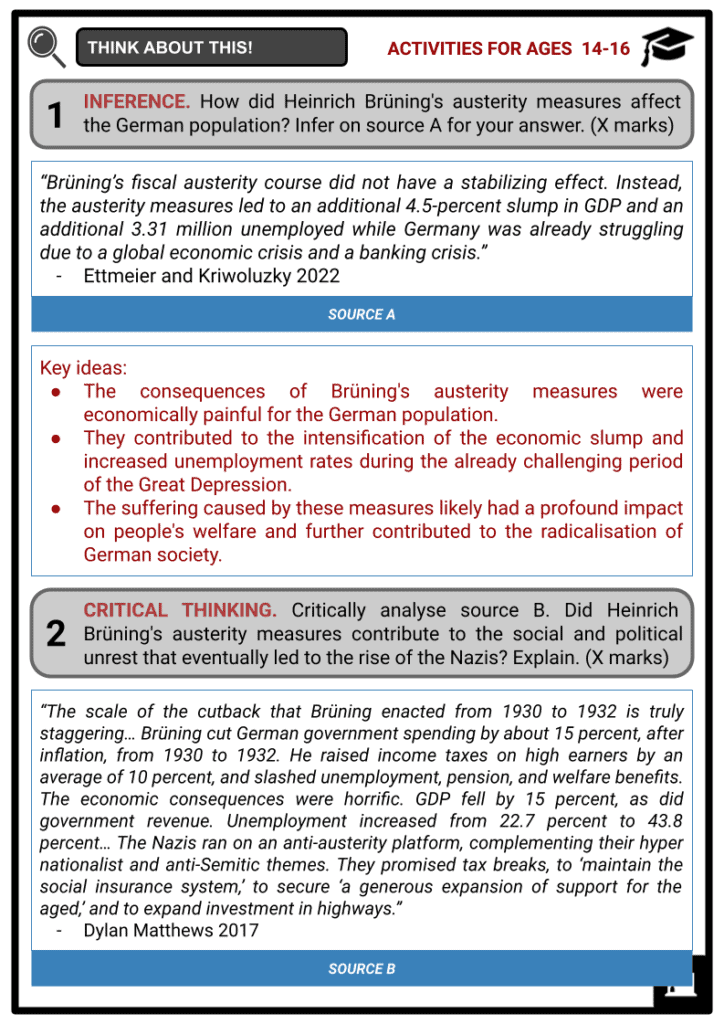Heinrich Brüning Worksheets
Do you want to save dozens of hours in time? Get your evenings and weekends back? Be able to teach about Heinrich Brüning to your students?
Our worksheet bundle includes a fact file and printable worksheets and student activities. Perfect for both the classroom and homeschooling!
Summary
- Early life and education of Heinrich Brüning
- His military service in World War I
- His political career
- Chancellorship and the Great Depression
- Later life and legacy
Key Facts And Information
Let’s know more about Heinrich Brüning!
Heinrich Brüning was a prominent German political figure in the early 20th century, most notably serving as Chancellor during the Weimar Republic. He achieved remarkable progress in German politics during the turbulent interwar period. His tenure, from 1930 to 1932, was marked by the economic hardship of the Great Depression, and his policies often revolved around strict fiscal austerity. Despite facing numerous challenges and opposition from various political factions, Brüning remained steadfast in his beliefs and pursued policies that he believed would bring stability to Germany.
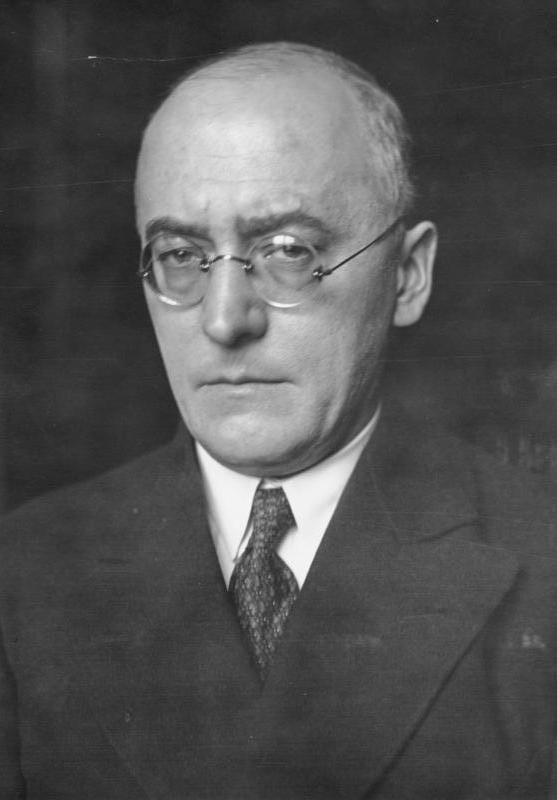
Early Life and Education
- Heinrich Brüning was born on 26 November 1885 in Münster, Germany. Raised in a devout Catholic family, Brüning attended the prestigious Gymnasium Paulinum in Münster, a school with a long history dating back to 797 CE. A diligent student, he excelled in his studies and developed a particular interest in history and politics.
- After completing his early education, Brüning pursued higher studies in political economy and medieval history at the University of Strasbourg. His time at this university marked a significant phase in his intellectual development.
- His mentors, renowned for their knowledge and ethical approach to scholarship, had a profound impact on Brüning's philosophical and intellectual perspectives. Under their influence, Brüning developed a deep understanding of social justice, absorbing the principles of equity, fairness and societal responsibility.
- This educational experience played a crucial role in shaping Brüning's approach to politics in his later life. He graduated with a strong academic record, leaving the university as a well-rounded scholar ready to make his mark on the political world.
- Brüning then continued his studies at the London School of Economics. Here he gained exposure to a diverse range of economic theories and perspectives. This period in London broadened his understanding of economics and social policies, equipping him with the knowledge that would later influence his political career.
- His thesis on the medieval economic history of his home region in Germany was particularly noted for its thorough research and innovative approach. Titled 'The Economic Structure of the Westphalian Countryside in the Middle Ages', the thesis delved into the economic transformations in rural Westphalia during the medieval period, capturing the nuanced shifts in the region's socio-economic fabric.
- Brüning's exploration of local economic history was reflective of his broader interest in societal structures and his belief in the role of economic factors in shaping political and social realities. Notably, the thesis was lauded for its detailed research, analytical rigour and innovative insights, a further testament to Brüning's intellectual prowess and dedication to scholarship.
Military Service in World War I
- Brüning was called to military service during World War I, a period that significantly influenced his views on politics and society. Enlisting in the German army, he served with distinction and was eventually promoted to the rank of Lieutenant. His experiences on the front lines provided him with first-hand exposure to the harsh realities of war, an experience that would greatly impact his later political ideologies.
- During his time in service, Brüning witnessed the devastating effects of war on both the military and civilian populations. The stark contrast between the destruction of war and the principles of fairness and social justice that he had studied struck a deep chord in him.
- This experience led him to ponder the role of political leadership in preventing such conflicts and mitigating their damaging consequences. It instilled in him a deep-seated commitment to peace and social justice, values that would guide his future political career.
- After the war, Brüning returned to his studies with renewed vigour, his experiences on the battlefield lending a deeper sense of purpose to his intellectual pursuits. The scars of war had left an indelible imprint on his mind, shaping his perspectives on socio-economic issues and influencing his approach to politics.
- Brüning's military service during World War I sparked his political career. The lessons he learnt on the battlefield helped shape his understanding of the role of politics in society and fuelled his desire to pursue a career in public service. His subsequent political career would be marked by a relentless commitment to peace, social justice and economic prosperity – values that were deeply ingrained in him during his time in the military.
Political Career
- Brüning's political career began in earnest after serving in World War I. His first venture into politics was as a member of the Centre Party, a moderate political organisation in Germany known for its advocacy of social justice and strong democratic institutions. His ability to articulate his values and his experiences on the battlefield quickly gained him recognition within the party.
- In 1920, he took on the role of party secretary, a position that allowed him to influence the party's political agenda and direction. In 1924, Brüning was elected to the Reichstag, the German parliament, representing his local constituency. His tenure in the Reichstag allowed him to voice his strong beliefs in social justice and peace.
- Throughout his term, he consistently advocated for policies aimed at alleviating economic hardship and promoting social equality. Despite the challenging political climate of the Weimar Republic, Brüning's steadfast commitment to his beliefs earned him a reputation as a politician of principle.
- Within the Centre Party, Brüining's influence grew. His intellectual prowess, coupled with his unwavering commitment to the party's principles, propelled him to the position of party leader in 1929. Under his leadership, the Centre Party championed policies aimed at addressing Germany's economic woes and maintaining peace in a time of growing political unrest.
- Brüning's dedication to these causes and his adept political leadership laid the groundwork for his appointment as Chancellor in 1930. His pre-chancellorship career was marked by a steadfast commitment to his values and an unwavering belief in the power of political leadership to effect change.
Chancellorship and the Great Depression
- Brüning assumed the mantle of Chancellorship in 1930, a period marred by the relentless onslaught of the Great Depression, which had sent shockwaves across the global economy. Germany was mired in a profound crisis, with stark economic stagnation, skyrocketing unemployment and widespread social discontent.
- The Wall Street crash of 1929 had a devastating impact on the German economy, mainly due to the country's dependence on American loans following the end of World War I. These loans were abruptly withdrawn after the crash, leaving Germany's fragile economy in a state of collapse.
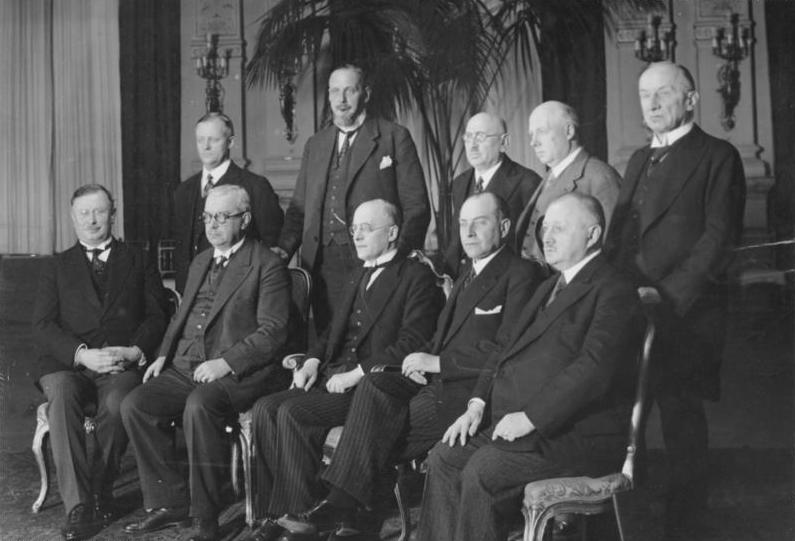
Brüning's first cabinet - Industrial output fell dramatically, unemployment soared to unprecedented levels, and inflation quickly spiralled out of control. The living standards of the German people plummeted, leading to widespread discontent and civil unrest. The economic and social fallout from the Great Depression severely undermined faith in the democratic government, paving the way for radical political movements.
- Brüning's tenure as Chancellor was defined by his efforts to navigate Germany through this tumultuous period. His economic policies, often regarded as austere and reactionary, were primarily aimed at mitigating the economic damage wrought by the depression. He implemented measures such as spending cuts and tax increases, policies that were controversial and met with significant resistance both within and outside his party.
- His implementation of stringent austerity measures was a major focal point of his chancellorship. He believed that cutting public expenditure would improve the budget deficit and stabilise the spiralling German economy. To this end, he instituted severe reductions in government spending, a move that resulted in significant cutbacks in public services and welfare programmes.
- In tandem with these spending cuts, Brüning also sought to balance the budget through tax reform. He introduced tax increases targeting various economic sectors. However, these measures were met with widespread public disapproval. The increased tax burden, combined with cuts in public spending, exacerbated the economic hardship faced by many Germans, further fuelling social unrest and undermining support for Brüning's government.
- These implementations, while well-intentioned, were harshly criticised. Critics argued that in a time of economic crisis, austerity measures only served to deepen the depression by reducing aggregate demand and stifling economic growth. They believed that rather than austerity, a more expansionary fiscal policy, focused on increasing government spending to stimulate the economy, would have been a more suitable approach.
Summary of Heinrich Brüning’s austerity measures:
-
- Spending Cuts: Brüning implemented significant cuts to government spending with the goal of reducing budget deficits. It is estimated that he cut German government spending by about 15 percent, adjusted for inflation, from 1930 to 1932.
- Tax Increases: Brüning raised income taxes as part of his austerity programme. The increased taxation was intended to generate revenue and reduce the budget deficit.
- Tight Credit Policy: Brüning pursued a policy of tight credit, which involved restricting access to credit and loans. This measure aimed to combat inflation and stabilise the currency.
- Reduction of Civil Service Salaries: Brüning rolled back civil service salary increases and implemented cuts in government expenditures, including reductions in salaries for civil servants.
- Cuts in Unemployment Insurance: Brüning also implemented cuts in unemployment insurance, which may have contributed to the rise in unemployment rates during his tenure.
- Despite the persistent economic woes, Brüning remained steadfast in his commitment to democratic processes and principles. He resisted the rising tide of extremist ideologies, staunchly opposing the expansionist policies of the National Socialist German Workers' Party (Nazis). His resolve was reflected in his famous quote, 'Better a terrible end than terror without end.'
- This uncompromising stance against the Nazis put Brüning in an uncertain position, as the economic crisis worsened and national sentiment swayed towards the extremist party's populist messaging. Led by Adolf Hitler, the Nazis capitalised on the widespread public discontent, promising solutions to Germany's economic woes and restoration of national pride. Despite the increasing popularity of the Nazis, Brüning refused to yield or compromise his democratic principles.
- Internationally, Brüning sought to renegotiate the terms of the Treaty of Versailles to alleviate the economic burden on Germany. He fervently advocated for the reduction of reparation payments and the return of the Prussian territories, arguing that these changes were crucial for Germany's economic recovery.
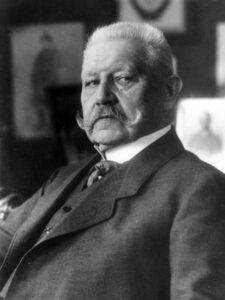
Paul von Hindenburg - However, Brüning's chancellorship was ultimately marred by the insurmountable challenges posed by the Great Depression and the volatile political environment of the time. His policies, though well-intentioned, struggled to stem the tide of economic decline, leading to a loss of public support. Moreover, his unwavering opposition to the Nazis eventually led to his downfall.
- Under pressure from various political factions and without the support of President Paul von Hindenburg, Brüning was forced to resign from his chancellorship in 1932, after just two years in office. His departure marked a turning point in German history, paving the way for Hitler's rise to power and the onset of the Third Reich.
- In retrospect, Heinrich Brüning's chancellorship during the Great Depression stands as a testament to the power of principled leadership in the face of profound adversity. Despite the enormous challenges that he faced, his unwavering commitment to democratic values and economic stability still resonates in the annals of German history. His time in office, despite the challenges faced, is a powerful testament to the lasting significance of political bravery and moral steadfastness.
Later Life and Legacy
- After he departed from the chancellery, Brüning moved into academia, taking up a teaching position at Harvard University. His profound understanding of political processes, international relations and economic strategies made him an influential figure in the academic world. Brüning continued to voice his concerns about the increasing threats to democratic values and the rise of totalitarian regimes in Europe.
- Brüning passed away on 30 March 1970, in Norwich, Vermont, USA. The end of his life was as dignified as his career had been, marked by a steadfast commitment to his principles and a deep sense of duty. Even in death, he left a potent legacy, one that continues to inspire scholars, politicians and students alike.
- Brüning left behind a legacy that continues to resonate in modern German politics. His dedication to democratic principles in the face of overwhelming adversity has been widely recognised as a testament to political courage. His efforts to mitigate the economic impact of the Great Depression, despite their limited success, demonstrated his commitment to economic stability and the welfare of the German people.
- Today, Brüning is remembered not only for his political tenacity but also for his academic contributions.
- His lectures and writings have provided valuable insights into the political and economic dynamics of the Weimar Republic and the rise of Nazism. His scholarly works are still referenced in contemporary political science and history, as they offer a unique perspective on one of the most tumultuous periods in German history.
Image Sources
- https://upload.wikimedia.org/wikipedia/commons/b/b1/Bundesarchiv_Bild_183-1989-0630-504%2C_Heinrich_Br%C3%BCning.jpg
- https://upload.wikimedia.org/wikipedia/commons/8/86/Bundesarchiv_Bild_146-2004-0144%2C_Reichskabinett_Br%C3%BCning_I.jpg
- https://upload.wikimedia.org/wikipedia/commons/1/1b/Bundesarchiv_Bild_183-C06886%2C_Paul_v._Hindenburg.jpg
Frequently Asked Questions
- Who was Heinrich Brüning?
Heinrich Brüning (1885-1970) was a German politician and academic who served as the Chancellor of Germany from 1930 to 1932 during the Weimar Republic period.
- Why is Heinrich Brüning's tenure significant in German history?
Brüning's time as Chancellor was marked by economic hardship and political instability, laying the groundwork for the rise of Adolf Hitler and the Nazi Party. His policies and the political struggles during his tenure contributed to the erosion of democratic institutions in Germany.
- How did Heinrich Brüning's term as Chancellor end?
Brüning's government lost support in the Reichstag, and President Paul von Hindenburg dismissed him as Chancellor in 1932. Franz von Papen succeeded him as Chancellor.

